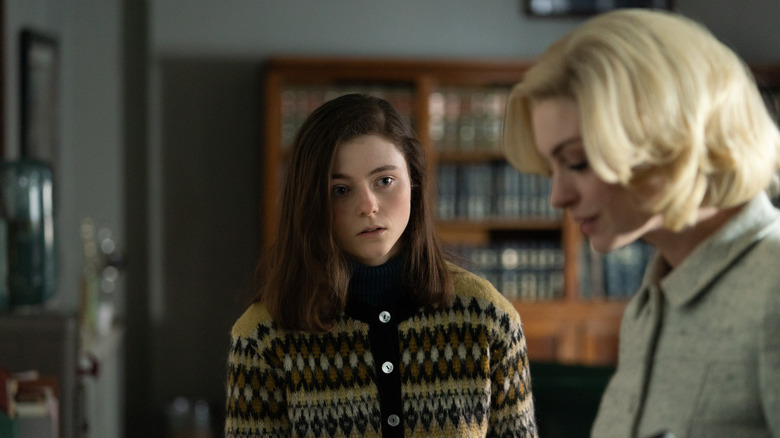Thomasin McKenzie’s character Eileen must have met Dexy’s Midnight Runners. While the band was on a vacation in the US in the early 70’s, they probably ran into her in Old Sully’s in Charlestown Massachusetts. Blackout drunk, the woman probably cornered the boys and delivered her thrilling strange tale growing up in New England, with the boys too petrified to stop her before she passed out at the bar. After DMR left, they penned their big hit, owing it all to our heroine, who probably wouldn’t have remembered the encounter at all. But that’s the Eileen life, folks, at that moment, she meant everything.
Eileen (McKenzie) is going through the motions of life in 1960s Mass. Caring for her forcibly retired ex cop father (Shea Whigham), Eileen has resigned herself to going through the motions of life, working a dead end job in a correctional facility for kids. All that changes in an instant one day: the day new prison psychologist Rebecca (Anne Hathaway) saunters into the job…as well as into Eileen’s dreams and desires.
The hard task here for director William Oldroyd is getting the audience ready for the twists and turns the third act takes. To do that, he needs the audience to feel Eileen’s melancholy and desperation for something good in her life. So welcome to winter in Massachusetts, the reason for seasonal affective disorder. Eileen’s life is awash in either dark or grey; dreary snowy mornings blend into grey prison interiors, which quickly turn into black nights. Her car makes her drive with the windows open in winter, so commutes blow too. And the people humbly complement the settings: Eileen’s bosses (Tonye Patano and Siobhan Fallon Hogan) and even her own father mock her to her face and behind her back. There’s not a moment in Eileen’s pre-Rebecca life that gives her any hope for happiness whatsoever. As she sadly admits, “Everyone’s pretty angry here. It’s Massachusetts.” You can feel that constant desolation pervades Eileen’s existence; we feel her broken weirdness during that emotion setting opening arc.
Then Hathaway enigmatically arrives, with that blonde hair a beacon of light. The poor girl has so little to hope for that immediately Rebecca’s attention becomes the most important thing to her. So any Rebecca time whatsoever means Eileen has her best day, and any missed connection brings the young girl back to her bleak present, which is now bleaker because of Rebecca goggles (like beer goggles). But since we’ve seen how weird the isolated Eileen can be, there’s a real worry of scaring away her new favorite person, or worse, as decades of Lifetime movies have taught us. Plus, what’s Rebecca’s deal? She clearly likes her work, and maybe a drink or two. Eileen has Rebecca goggles, but the audience doesn’t, and another set of Lifetime movies should have your hair on edge too. Where this movie goes I will not say, but the story isn’t exactly linear. It builds wonderfully to an ending that fits this specific tale, and not just something designed to appease bloodthirsty Lifetime audiences.
Ok, that’s too many Lifetime movie references. Eileen is better than any of those mediocre pot boilers, because of the wonderful story, setting, and acting, from both Thomasin McKenzie and Anne Hathaway. There’s more than a few twists and turns that will make the audience go Come on, Eileen multiple times, but sometimes in sad ways, happy ways, frustrating ways, etc. I don’t think there’s a Ta-Loo-Ry-Aye moment, and I would never tell you if there was anyways, cause you should see for yourself if there is, or if Dexy’s plays over the credits.

